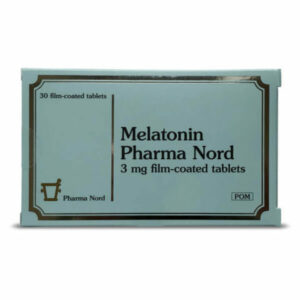Jet Lag
Struggling to sleep after a long flight? Jet lag can disrupt your sleep and mood, affecting your daily life. My Pharmacy offers jet lag prescription medication in the UK with next-day delivery.
Our jet lag prescriptions include either generic Melatonin 3mg or the branded version, Circadin. This medication is a synthetic form of melatonin, the hormone that regulates sleep-wake cycles, helping you adjust to new time zones.

-
About Jet Lag
Jet lag is a temporary sleep disorder that occurs when a person travels across multiple time zones quickly, disrupting their body’s internal clock. This condition is common among long-distance travellers and can significantly impact sleep patterns, mood, and overall health. Jet lag pills, such as those containing melatonin, are often used to help reset the body’s internal clock and provide jet lag relief. No jet lag pills and other treatments aim to minimise the effects of this condition and help travellers adjust to new time zones more efficiently.
-
Symptoms of Jet Lag
Jet lag is a temporary sleep disorder that occurs when a person travels across multiple time zones quickly, disrupting their body’s internal clock. This condition is common among long-distance travellers and can significantly impact sleep patterns, mood, and overall health. Jet lag pills, such as those containing melatonin, are often used to help reset the body’s internal clock and provide jet lag relief. No jet lag pills and other treatments aim to minimise the effects of this condition and help travellers adjust to new time zones more efficiently.
Symptoms of Jet Lag
Jet lag occurs when your body’s internal clock is out of sync with the new local time, leading to a variety of symptoms. Here are the primary symptoms:
Sleep Disturbances
● Insomnia: Difficulty falling asleep or staying asleep at night.
● Daytime Sleepiness: Feeling unusually drowsy or fatigued during the day.
● Poor Sleep Quality: Frequent awakenings or restless sleep.Physical Symptoms
● Fatigue and Lethargy: Persistent tiredness and lack of energy.
● Headaches: Mild to severe headaches can occur.
● Digestive Issues: Upset stomach, nausea, constipation, or changes in appetite.
● General Malaise: A general feeling of discomfort or uneasiness.Cognitive and Emotional Symptoms
● Difficulty Concentrating: Problems with focus, memory, and cognitive function.
● Mood Changes: Irritability, anxiety, or mood swings.
● Confusion and Disorientation: Feeling out of sorts and disoriented in the new time zone.Jet lag symptoms can vary in intensity depending on the number of time zones crossed, the direction of travel (eastward travel often causes more severe symptoms), and individual susceptibility. Symptoms typically improve within a few days as your body adjusts to the new time zone.
-
Diagnosis
While a detailed diagnostic process for jet lag may not be necessary, offering some guidance is beneficial. Jet lag is typically self-diagnosed based on symptoms and recent travel history.
For most travellers, jet lag is a temporary condition that resolves on its own. However, if symptoms are severe and significantly impact daily functioning, it is important to seek medical advice. A healthcare provider will evaluate the symptoms and consider the travel history. In rare cases, further assessments may be conducted to rule out other conditions.
Jet lag is primarily diagnosed through the evaluation of symptoms and travel history. Here’s how it is typically diagnosed:
● Symptom Review: Healthcare providers will ask about the symptoms experienced, such as difficulty sleeping, daytime fatigue, headaches, and digestive issues. They will also consider the severity and duration of these symptoms.
● Travel History: Confirmation of recent travel across two or more time zones is crucial for diagnosing jet lag. This helps distinguish it from other sleep disorders or medical conditions.
● Clinical Evaluation: If symptoms are severe or persistent, a healthcare provider might conduct a more thorough evaluation. This can include discussing sleep patterns, daily routines, and overall health to rule out other potential causes.
● Sleep Study: In rare cases, particularly if there is a suspicion of underlying sleep disorders, a sleep study (polysomnography) might be conducted to assess sleep quality and patterns. -
Treatment
Travelling across multiple time zones can disrupt your body’s natural sleep-wake cycle, leading to jet lag. Melatonin, a hormone that regulates sleep-wake cycles, is commonly used in prescription pills to alleviate these symptoms.
How Melatonin Works
Melatonin supplements help realign the circadian rhythm by signalling to the brain that it is time to sleep. Taking melatonin at the appropriate times before and after travel can help reduce the severity of jet lag symptoms. Studies have shown that melatonin is effective in decreasing jet lag when taken close to the target bedtime at the destination, particularly after eastward flights which tend to cause more severe jet lag.
At My Pharmacy, we offer two effective melatonin-based products to help manage jet lag:
Circadin (Melatonin) 2mg (30 Tablets)
- Benefits: Treats the symptoms of jet lag by inducing sleep at the correct time of day.
- Active Ingredient: Melatonin.
- Usage: Prolonged-release formulation helps maintain sleep throughout the night, aiding in adjusting to the new time zone.
Melatonin 3mg Tablets (30 Tablets)
- Benefits: Provides relief from jet lag symptoms and helps adjust to new time zones.
- Active Ingredient: Melatonin.
- Usage: Helps to fall asleep faster and improves overall sleep quality during travel transitions.
Practical Tips - Timing: Melatonin should be taken in the evening at the destination to help synchronise the internal clock to the new local time.
- Dosage: Effective doses range from 0.5mg to 5mg. Higher doses up to 5mg have been shown to help people fall asleep faster and improve sleep quality, though doses above this do not provide additional benefits.
Avoiding Light: Combine melatonin with appropriate light exposure strategies to maximise its effectiveness in resetting your internal clock.
By using melatonin-based jet lag pills like those offered by My Pharmacy, travellers can significantly reduce the discomfort associated with time zone changes and enjoy a smoother transition to their new environment.
-
Prevention Strategies
Preventing jet lag can be effectively managed through several non-medicinal strategies. Here are some steps to help reduce the impact of jet lag:
● Adjust Your Sleep Schedule Before Travelling: Gradually adjust your sleep schedule a few days before departure to align with the destination’s time zone. For eastward travel, go to bed and wake up an hour earlier each day. For westward travel, delay your sleep and wake times.
● Light Exposure: Exposure to bright morning light helps adjust to earlier time zones (eastward travel). Conversely, evening light exposure helps adapt to later time zones (westward travel). Plan your light exposure based on your destination’s time zone to help reset your internal clock.
● Stay Hydrated: Staying hydrated is crucial as dehydration can exacerbate jet lag symptoms. Drink plenty of water before, during, and after your flight. Avoid alcohol and caffeine, which can lead to dehydration and disrupt sleep.
● Optimise Your Sleep Environment: Ensure your sleeping environment is conducive to rest. Use earplugs and an eye mask to block out noise and light. Adjust the room temperature to a comfortable level and use a comfortable pillow and blanket.
● Exercise: Light exercise such as walking or stretching can help maintain your energy levels and improve your mood. Exercise during daylight hours to further help your body adjust to the new time zone.
● Caffeine Management: Use caffeine wisely to help stay awake during the day, but avoid it in the afternoon and evening as it can interfere with your sleep. A cup of coffee in the morning can help you stay alert without disrupting your sleep schedule.
● Plan Your Meals: Eat meals according to the destination’s time zone. This can help your body adapt more quickly to the new schedule. Light, nutritious meals are preferable over heavy, rich foods which can disrupt your sleep.
● Nap Wisely: Short Naps: If you’re feeling extremely tired, take short naps of 20-30 minutes during the day. Avoid long naps that can interfere with night time sleep.














